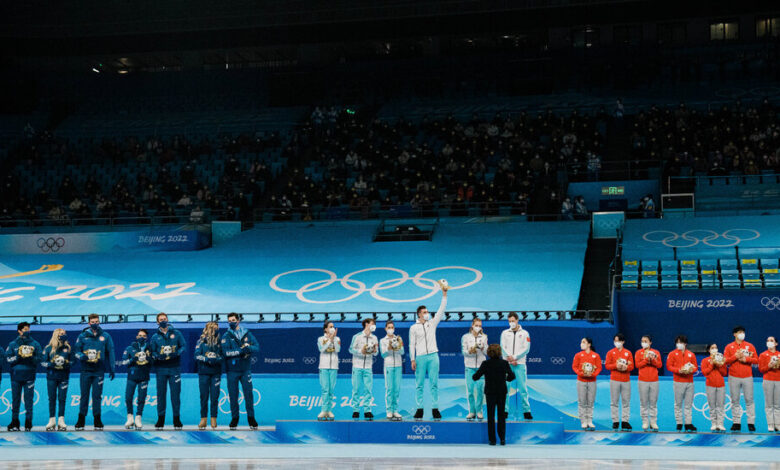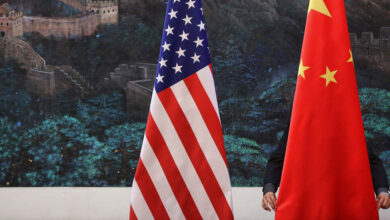Russian Figure Skaters Will Get Olympic Bronze After Valieva Disqualification

International skating’s governing body on Tuesday sought to put an end to a two-year-old controversy by revising the disputed results of a marquee figure skating competition at the 2022 Beijing Winter Olympics. But in stripping Russia of its victory in the team event, awarding the gold medal to the United States and denying Canada the bronze it had been expecting, the sport may have only set the stage for yet another protracted legal fight.
The revised finishes were announced by the skating body, the International Skating Union, one day after the teenage Russian star Kamila Valieva was banned for four years for doping. Disqualifying Valieva, a 15-year-old prodigy who had led Russia to an apparent victory, had the most immediate effect on the Olympic team standings: elevating the U.S. to gold and Japan to silver, while, surprisingly, dropping Russia just enough that it could still claim the bronze.
Within hours, Russia’s Olympic committee, already furious about Valieva’s ban, announced that it would appeal any outcome that denied it the team gold. Canadian officials quickly threatened to appeal the ruling as well. That left skating officials and the International Olympic Committee, which had chosen not to award medals in the team event until Valieva’s doping case was resolved, wondering how they could at last arrange a “dignified Olympic medal ceremony” for an ugly dispute that appeared nowhere near its end.
The decision to allow Russia to earn a medal despite the presence of an athlete convicted of doping raised yet more questions about Russia’s influence over top sports bodies. It also highlighted the inability of global sports to enforce rules on doping and to punish athletes and countries in a timely manner.
Critics have for years accused the I.O.C. of taking a soft approach on Russia by issuing tough-sounding sanctions that still allowed Russian athletes and teams to take part in competitions like the Olympics. Others noted that Russia’s antidoping agency was itself banned when it conducted the initial investigation into Valieva’s positive test.
“It’s unimaginable that a young woman, Valieva, is thrown under the bus with a four-year sanction, but Russia is allowed to keep Olympic glory with the bronze,” Travis Tygart, the chief executive of the United States Anti-Doping Agency, said. “It reeks of political favoritism, and there is lots of explaining to do, as athletes deserve answers.”
Now, rather than a neat resolution to a scandal that has already dragged on for two years, figure skating — and the Olympic movement — faces the prospect of new questions about doping and its consequences, and new appeals to the Court of Arbitration for Sport that could take months, or even years, to resolve.
In revising the results on Tuesday, the skating union said that it had disqualified Valieva and dismissed all the points and results she had posted in competitions that took place after she had submitted a positive sample to drug testers on Christmas Day in 2021. The most high-profile of those was the Beijing Olympics weeks later, and the team event that took place early in the Games.
Her disqualification lifted the United States into first place, Japan into second and dropped Russia to third.
But in a curious bit of math, the I.S.U. adjusted only the final points totals for each team, and did not reallocate the 20 points Valieva relinquished to the other women’s competitors. Without the two extra points it believed it should have received from improved finishes in the women’s short and long programs, Canada was left in fourth place — a single point behind Russia’s adjusted total.
Canada’s skating federation said it was “extremely disappointed” and that it would “consider all options to appeal this decision.” It cited a provision buried deep in skating’s rules that says competitors “who initially placed lower than the disqualified Competitor(s) will move up accordingly in their placement(s).”
The Russian Olympic committee, meanwhile, said it was already preparing paperwork to appeal any reallocation of the team medals. In a previous statement on Monday, it had cast doubt on the “objectivity and impartiality” of the court that had banned Valieva, and like Canada pointed to skating’s rule book to fortify its position.
According to those rules, Russia said, “the results of team competitions at the 2022 Olympic Winter Games do not depend on the outcome of the consideration of the individual case of Kamila Valieva, and the awards won by our team in Beijing cannot be legally subject to review.”
Tuesday’s announcement also stripped Valieva of any results she achieved in the period in which she was ineligible, including not only the team event but also her fourth-place finish in the singles event in Beijing and her victory in the 2022 European championships.
Her four-year ban will end in December 2025, just in time to allow her to compete in the next Olympics, in February 2026 in Italy.
A Kremlin spokesman, Dmitri S. Peskov, on Monday ridiculed Valieva’s ban as a “politicized decision.” On Tuesday, he broadened his criticisms, suggesting that any result that took the gold away from Russia was unacceptable.
“We don’t agree with these decisions, neither by the court nor by the federation,” he said. “We don’t accept them.”
He added: “Upon their return from China, from the Olympics, these athletes were honored as Olympic champions. We are convinced that for us they will always remain Olympic champions. No matter what decisions were made in this regard, even unfair ones.”
The I.S.U., the skating governing body, said Tuesday that it would coordinate with the International Olympic Committee on the next steps in implementing its decision — essentially the long-delayed awarding of the medals from the team competition to the athletes who earned them.
The medals themselves remain in limbo. Unclear at the time about who had actually won what, the I.O.C. took the unprecedented step of retaining possession of the team golds, silvers and bronzes that were to be awarded in Beijing. It was the first time in Olympic history that medals were not awarded in a completed event.
United States Olympic officials said Tuesday that they would press to have its team’s gold medals awarded regardless of what is happening with Russia or Canada, or any appeals. “There’s no reason for any delay,” said Sarah Hirshland, the chief executive of the United States Olympic and Paralympic Committee. “We are focused on getting those medals to Team USA.”
Ms. Hirshland said the U.S. skaters had hoped to receive their medals at the Paris Olympics this summer. “That would be a dream scenario,” said the ice dancer Madison Chock, a member of the American team in Beijing.
Ivan Nechepurenko and Juliet Macur contributed reporting.




